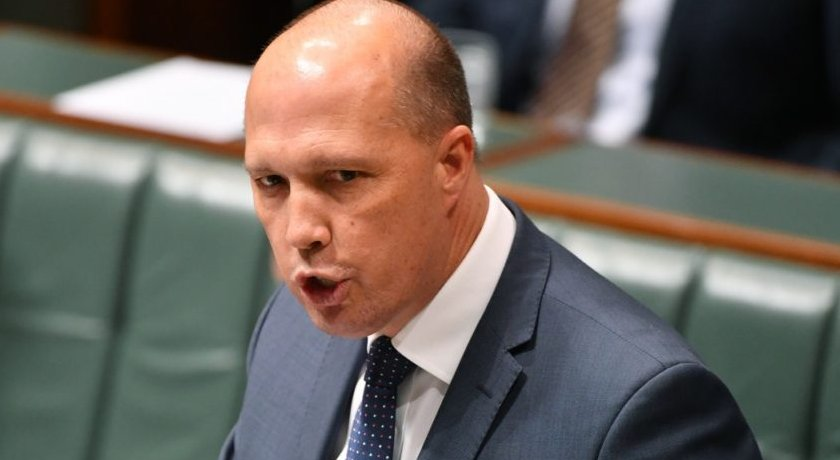While Solicitor-General Stephen Donahgue QC deemed the Member for Dickson “not incapable” of sitting in Parliament, freeing him to run in the leadership ballot ultimately won by Scott Morrison, questions still surround Mr Dutton’s eligibility.

Former Home Affairs and Immigration Minister Peter Dutton has not been elected leader of the federal Liberal Party – and therefore will not be our 30th Prime Minister – but that does not necessarily mean his constitutional concerns are finished.
And while that appears to have allowed him to stand for the Liberal leadership unencumbered, it leaves open other queries about the validity of his election in the Queensland seat of Dickson.
The relevant subsection of our founding document, s44(v) provides that a person who has direct or indirect pecuniary interest in an agreement with the Public Service of the Commonwealth is “incapable of being chosen or of sitting” in the House, and if s44(v) is engaged after a Member has been elected, s45(i) operates to render the Member’s place vacant.
The question put to the Solicitor-General – by Attorney-General Christian Porter – was whether Mr Dutton’s interests in the RHT Family Trust, including but not limited to the Camelia Avenue Childcare Centre, meant he was able to be validly elected by his constituents.
The “beneficial interest” as a “beneficiary” was declared by Mr Dutton in his House of Representatives ‘Statement of Registrable Interests to the 45th Parliament’ on 12 October 2016.
“In my opinion there is no such agreement between RHT Investments and the Public Service of the Commonwealth, and therefore no agreement in which Mr Dutton could have an indirect pecuniary interest by virtue of his status as a beneficiary of the RHT Family Trust,” Mr Donaghue wrote.
This opinion was formed, he continued, on the basis that an application by RHT Investments to become, and be approved as, a provider of childcare services does not constitute an “agreement” as intended by s44(v).
But the Solicitor-General stopped short of offering absolution in his advice, writing: “While I consider the position summarised to represent the better view, it is impossible to state the position with certainty”.
There were three reasons for this: the facts concerning Mr Dutton have likely not been assessed against s44(v) by the High Court, there may be facts that the Solicitor-General himself is unaware of, and that there is “a significant division” of opinion on the High Court as to key questions concerning the legal operation of s44(v), which “creates some difficulty in predicting the manner in which the court would analyse the facts”.
The High Court might endeavour, he mused, to “create a clearer line” in the interests of certainty, which might involve a broader reading of this particular constitutional clause.
“For those reasons I consider there to be some risk, particularly in light of the substantial size of the payments that appear to have been made by the Commonwealth to RHT Investments, that the High Court might conclude that there is a conflict between Mr Dutton’s duty as a parliamentarian and his personal interests,” he wrote.
“The court might consider those payments to have created the expectation of benefit to Mr Dutton, on the basis that they would contribute to the amount of surplus income available to be distributed to beneficiaries of the RHT Family Trust, and that Mr Dutton had an indirect pecuniary interest on that basis.”
However, Mr Donaghue opined, while that risk cannot be entirely discounted, it would “remain necessary for the court to identify an agreement” in which Mr Dutton held that interest.
The Solicitor-General himself noted that he was unable to identify such an interest.
“For that reason, I consider that the High Court is more likely to conclude that the size of the payments made to RHT Investments is not relevant to the s44(v) analysis, because those payments were made pursuant to statutory entitlements of particular individuals who use child care services operated by RHT Investments.”
What happens next is unclear.
The government’s majority in the House of Representatives is threatened by outgoing Prime Minister Malcolm Turnbull’s pledge to leave Parliament, leaving Scott Morrison without a one-seat edge in the lower house.
Questions over Mr Dutton’s eligibility are unlikely to subside in the coming days and weeks, with political analysts and possibly even non-Liberal and National parliamentarians pushing for greater clarity regarding Mr Dutton’s position, perhaps with a referral to the court.
If he is indeed referred to the High Court – and is found to have been invalidly elected – the Prime Minister will need not only to convince the crossbench to offer supply and confidence in a minority government, he will also need to assure Governor-General Sir Peter Cosgrove that he can carry votes in a hung parliament.
All of this, of course, in addition to what the ascension of Mr Morrison to the top job will mean for lawyers and legislative and judicial matters.
In concluding his advice, Mr Donaghue has almost appeared to set the stage for such questions being asked: “It is not possible to reach a definitive conclusion on that matter without more detailed factual information”.

Jerome Doraisamy is the managing editor of professional services (including Lawyers Weekly, HR Leader, Accountants Daily, and Accounting Times). He is also the author of The Wellness Doctrines book series, an admitted solicitor in New South Wales, and a board director of the Minds Count Foundation.
You can email Jerome at: